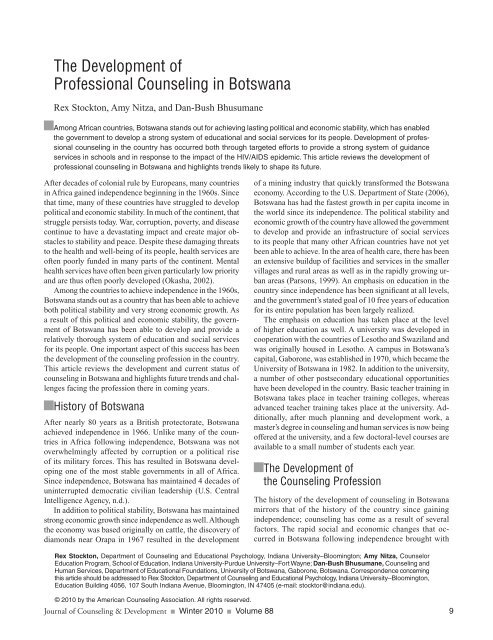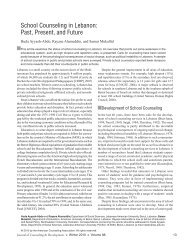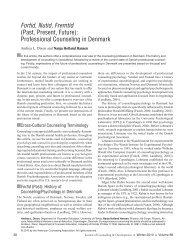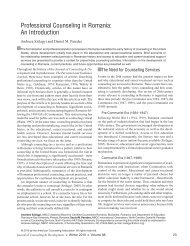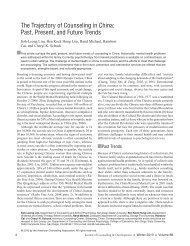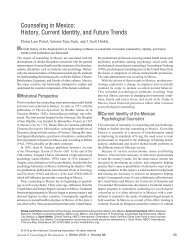The Development of Professional Counseling in Botswana - IRCEP
The Development of Professional Counseling in Botswana - IRCEP
The Development of Professional Counseling in Botswana - IRCEP
You also want an ePaper? Increase the reach of your titles
YUMPU automatically turns print PDFs into web optimized ePapers that Google loves.
<strong>The</strong> <strong>Development</strong> <strong>of</strong><br />
Pr<strong>of</strong>essional <strong>Counsel<strong>in</strong>g</strong> <strong>in</strong> <strong>Botswana</strong><br />
Rex Stockton, Amy Nitza, and Dan-Bush Bhusumane<br />
Among African countries, <strong>Botswana</strong> stands out for achiev<strong>in</strong>g last<strong>in</strong>g political and economic stability, which has enabled<br />
the government to develop a strong system <strong>of</strong> educational and social services for its people. <strong>Development</strong> <strong>of</strong> pr<strong>of</strong>essional<br />
counsel<strong>in</strong>g <strong>in</strong> the country has occurred both through targeted efforts to provide a strong system <strong>of</strong> guidance<br />
services <strong>in</strong> schools and <strong>in</strong> response to the impact <strong>of</strong> the HIV/AIDs epidemic. This article reviews the development <strong>of</strong><br />
pr<strong>of</strong>essional counsel<strong>in</strong>g <strong>in</strong> <strong>Botswana</strong> and highlights trends likely to shape its future.<br />
After decades <strong>of</strong> colonial rule by Europeans, many countries<br />
<strong>in</strong> Africa ga<strong>in</strong>ed <strong>in</strong>dependence beg<strong>in</strong>n<strong>in</strong>g <strong>in</strong> the 1960s. S<strong>in</strong>ce<br />
that time, many <strong>of</strong> these countries have struggled to develop<br />
political and economic stability. In much <strong>of</strong> the cont<strong>in</strong>ent, that<br />
struggle persists today. War, corruption, poverty, and disease<br />
cont<strong>in</strong>ue to have a devastat<strong>in</strong>g impact and create major obstacles<br />
to stability and peace. Despite these damag<strong>in</strong>g threats<br />
to the health and well-be<strong>in</strong>g <strong>of</strong> its people, health services are<br />
<strong>of</strong>ten poorly funded <strong>in</strong> many parts <strong>of</strong> the cont<strong>in</strong>ent. Mental<br />
health services have <strong>of</strong>ten been given particularly low priority<br />
and are thus <strong>of</strong>ten poorly developed (Okasha, 2002).<br />
Among the countries to achieve <strong>in</strong>dependence <strong>in</strong> the 1960s,<br />
<strong>Botswana</strong> stands out as a country that has been able to achieve<br />
both political stability and very strong economic growth. As<br />
a result <strong>of</strong> this political and economic stability, the government<br />
<strong>of</strong> <strong>Botswana</strong> has been able to develop and provide a<br />
relatively thorough system <strong>of</strong> education and social services<br />
for its people. One important aspect <strong>of</strong> this success has been<br />
the development <strong>of</strong> the counsel<strong>in</strong>g pr<strong>of</strong>ession <strong>in</strong> the country.<br />
This article reviews the development and current status <strong>of</strong><br />
counsel<strong>in</strong>g <strong>in</strong> <strong>Botswana</strong> and highlights future trends and challenges<br />
fac<strong>in</strong>g the pr<strong>of</strong>ession there <strong>in</strong> com<strong>in</strong>g years.<br />
History <strong>of</strong> <strong>Botswana</strong><br />
After nearly 80 years as a British protectorate, <strong>Botswana</strong><br />
achieved <strong>in</strong>dependence <strong>in</strong> 1966. Unlike many <strong>of</strong> the countries<br />
<strong>in</strong> Africa follow<strong>in</strong>g <strong>in</strong>dependence, <strong>Botswana</strong> was not<br />
overwhelm<strong>in</strong>gly affected by corruption or a political rise<br />
<strong>of</strong> its military forces. This has resulted <strong>in</strong> <strong>Botswana</strong> develop<strong>in</strong>g<br />
one <strong>of</strong> the most stable governments <strong>in</strong> all <strong>of</strong> Africa.<br />
S<strong>in</strong>ce <strong>in</strong>dependence, <strong>Botswana</strong> has ma<strong>in</strong>ta<strong>in</strong>ed 4 decades <strong>of</strong><br />
un<strong>in</strong>terrupted democratic civilian leadership (U.S. Central<br />
Intelligence Agency, n.d.).<br />
In addition to political stability, <strong>Botswana</strong> has ma<strong>in</strong>ta<strong>in</strong>ed<br />
strong economic growth s<strong>in</strong>ce <strong>in</strong>dependence as well. Although<br />
the economy was based orig<strong>in</strong>ally on cattle, the discovery <strong>of</strong><br />
diamonds near Orapa <strong>in</strong> 1967 resulted <strong>in</strong> the development<br />
<strong>of</strong> a m<strong>in</strong><strong>in</strong>g <strong>in</strong>dustry that quickly transformed the <strong>Botswana</strong><br />
economy. Accord<strong>in</strong>g to the U.S. Department <strong>of</strong> State (2006),<br />
<strong>Botswana</strong> has had the fastest growth <strong>in</strong> per capita <strong>in</strong>come <strong>in</strong><br />
the world s<strong>in</strong>ce its <strong>in</strong>dependence. <strong>The</strong> political stability and<br />
economic growth <strong>of</strong> the country have allowed the government<br />
to develop and provide an <strong>in</strong>frastructure <strong>of</strong> social services<br />
to its people that many other African countries have not yet<br />
been able to achieve. In the area <strong>of</strong> health care, there has been<br />
an extensive buildup <strong>of</strong> facilities and services <strong>in</strong> the smaller<br />
villages and rural areas as well as <strong>in</strong> the rapidly grow<strong>in</strong>g urban<br />
areas (Parsons, 1999). An emphasis on education <strong>in</strong> the<br />
country s<strong>in</strong>ce <strong>in</strong>dependence has been significant at all levels,<br />
and the government’s stated goal <strong>of</strong> 10 free years <strong>of</strong> education<br />
for its entire population has been largely realized.<br />
<strong>The</strong> emphasis on education has taken place at the level<br />
<strong>of</strong> higher education as well. A university was developed <strong>in</strong><br />
cooperation with the countries <strong>of</strong> Lesotho and Swaziland and<br />
was orig<strong>in</strong>ally housed <strong>in</strong> Lesotho. A campus <strong>in</strong> <strong>Botswana</strong>’s<br />
capital, Gaborone, was established <strong>in</strong> 1970, which became the<br />
University <strong>of</strong> <strong>Botswana</strong> <strong>in</strong> 1982. In addition to the university,<br />
a number <strong>of</strong> other postsecondary educational opportunities<br />
have been developed <strong>in</strong> the country. Basic teacher tra<strong>in</strong><strong>in</strong>g <strong>in</strong><br />
<strong>Botswana</strong> takes place <strong>in</strong> teacher tra<strong>in</strong><strong>in</strong>g colleges, whereas<br />
advanced teacher tra<strong>in</strong><strong>in</strong>g takes place at the university. Additionally,<br />
after much plann<strong>in</strong>g and development work, a<br />
master’s degree <strong>in</strong> counsel<strong>in</strong>g and human services is now be<strong>in</strong>g<br />
<strong>of</strong>fered at the university, and a few doctoral-level courses are<br />
available to a small number <strong>of</strong> students each year.<br />
<strong>The</strong> <strong>Development</strong> <strong>of</strong><br />
the <strong>Counsel<strong>in</strong>g</strong> Pr<strong>of</strong>ession<br />
<strong>The</strong> history <strong>of</strong> the development <strong>of</strong> counsel<strong>in</strong>g <strong>in</strong> <strong>Botswana</strong><br />
mirrors that <strong>of</strong> the history <strong>of</strong> the country s<strong>in</strong>ce ga<strong>in</strong><strong>in</strong>g<br />
<strong>in</strong>dependence; counsel<strong>in</strong>g has come as a result <strong>of</strong> several<br />
factors. <strong>The</strong> rapid social and economic changes that occurred<br />
<strong>in</strong> <strong>Botswana</strong> follow<strong>in</strong>g <strong>in</strong>dependence brought with<br />
Rex Stockton, Department <strong>of</strong> <strong>Counsel<strong>in</strong>g</strong> and Educational Psychology, Indiana University–Bloom<strong>in</strong>gton; Amy Nitza, Counselor<br />
Education Program, School <strong>of</strong> Education, Indiana University-Purdue University–Fort Wayne; Dan-Bush Bhusumane, <strong>Counsel<strong>in</strong>g</strong> and<br />
Human Services, Department <strong>of</strong> Educational Foundations, University <strong>of</strong> <strong>Botswana</strong>, Gaborone, <strong>Botswana</strong>. Correspondence concern<strong>in</strong>g<br />
this article should be addressed to Rex Stockton, Department <strong>of</strong> <strong>Counsel<strong>in</strong>g</strong> and Educational Psychology, Indiana University–Bloom<strong>in</strong>gton,<br />
Education Build<strong>in</strong>g 4056, 107 South Indiana Avenue, Bloom<strong>in</strong>gton, IN 47405 (e-mail: stocktor@<strong>in</strong>diana.edu).<br />
© 2010 by the American <strong>Counsel<strong>in</strong>g</strong> Association. All rights reserved.<br />
Journal <strong>of</strong> <strong>Counsel<strong>in</strong>g</strong> & <strong>Development</strong> ■ W<strong>in</strong>ter 2010 ■ Volume 88
Stockton, Nitza, & Bhusumane<br />
them an evolv<strong>in</strong>g set <strong>of</strong> changes <strong>in</strong> the lives <strong>of</strong> <strong>in</strong>dividuals<br />
and a correspond<strong>in</strong>g need for services and structures to address<br />
these changes. As noted by Nav<strong>in</strong> (1992), the positive<br />
changes associated with the transition <strong>of</strong> <strong>Botswana</strong> <strong>in</strong>to a<br />
modern society also brought with them a number <strong>of</strong> serious<br />
social challenges that are more common <strong>in</strong> modern societies,<br />
<strong>in</strong>clud<strong>in</strong>g <strong>in</strong>creased rates <strong>of</strong> unemployment, crime, teenage<br />
pregnancy, and substance abuse, among others. Additionally,<br />
as <strong>in</strong> many other parts <strong>of</strong> Africa, the <strong>in</strong>creased urbanization<br />
<strong>of</strong> the society has slowly resulted <strong>in</strong> a breakdown <strong>of</strong> the extended<br />
family system <strong>of</strong> support and a need for an organized<br />
support system to meet the needs traditionally met through<br />
the extended family (Bhusumane, Maphorisa, Motswaledi,<br />
& Nyati, 1990; Okasha, 2002).<br />
A crucial factor <strong>in</strong> the development <strong>of</strong> counsel<strong>in</strong>g <strong>in</strong><br />
<strong>Botswana</strong> was the need for career guidance services for<br />
students. One important aspect <strong>of</strong> the goal <strong>of</strong> education <strong>in</strong><br />
the country s<strong>in</strong>ce <strong>in</strong>dependence has been the development<br />
<strong>of</strong> human resources to meet the needs <strong>of</strong> the expand<strong>in</strong>g<br />
economy. A program <strong>of</strong> career guidance thus became an<br />
important component <strong>of</strong> education from early on. Initial<br />
efforts to provide career guidance <strong>in</strong>formation to students<br />
<strong>in</strong> secondary schools <strong>in</strong> <strong>Botswana</strong> date back to 1963, when<br />
a workshop was held to tra<strong>in</strong> a selected group <strong>of</strong> secondary<br />
school teachers <strong>in</strong> career guidance. Follow<strong>in</strong>g the workshop,<br />
a system for the provision <strong>of</strong> these services was implemented<br />
<strong>in</strong> which “careers masters/mistresses” were designated and<br />
assigned to each secondary school to provide career <strong>in</strong>formation<br />
(Nav<strong>in</strong>, 1992; Republic <strong>of</strong> <strong>Botswana</strong> M<strong>in</strong>istry <strong>of</strong><br />
Education, 1996).<br />
Although this emphasis on career guidance cont<strong>in</strong>ued,<br />
efforts were gradually undertaken to develop a more comprehensive<br />
program <strong>of</strong> guidance and counsel<strong>in</strong>g <strong>in</strong> the schools. In<br />
1985, a policy direction sem<strong>in</strong>ar attended by senior <strong>of</strong>ficials <strong>in</strong><br />
government recommended that the career guidance services<br />
should be expanded to <strong>in</strong>clude social, educational, and personal<br />
needs <strong>of</strong> learners. This was followed by a consultancy<br />
(recommended by the sem<strong>in</strong>ar) to identify the needs for guidance<br />
and counsel<strong>in</strong>g at the different levels <strong>of</strong> education. <strong>The</strong><br />
consultant, Sally Nav<strong>in</strong>, recommended among other th<strong>in</strong>gs<br />
that there should be an <strong>of</strong>ficer responsible for guidance services<br />
with<strong>in</strong> the M<strong>in</strong>istry <strong>of</strong> Education and that a staff member<br />
with<strong>in</strong> the Faculty <strong>of</strong> Education at the University <strong>of</strong> <strong>Botswana</strong><br />
be tra<strong>in</strong>ed to <strong>of</strong>fer courses <strong>in</strong> counsel<strong>in</strong>g.<br />
This recommendation to make counselor tra<strong>in</strong><strong>in</strong>g available<br />
at the university was an important one; at the time <strong>of</strong> the<br />
recommendations, there was very little preservice tra<strong>in</strong><strong>in</strong>g<br />
available <strong>in</strong> guidance and counsel<strong>in</strong>g. Early on, the guidance<br />
and counsel<strong>in</strong>g program was delivered by teacher-counselors<br />
(Roll<strong>in</strong> & Witmer, 1992) who either volunteered or were<br />
selected for these roles. Teacher-counselors were teachers<br />
<strong>of</strong> specific subjects who also took on guidance counsel<strong>in</strong>g<br />
duties, <strong>of</strong>ten without any release time or compensation for<br />
do<strong>in</strong>g so and almost always with no tra<strong>in</strong><strong>in</strong>g. Thus, there<br />
was a need for the development <strong>of</strong> a comprehensive program<br />
<strong>of</strong> <strong>in</strong>-service tra<strong>in</strong><strong>in</strong>g for practic<strong>in</strong>g teacher-counselors, <strong>in</strong><br />
addition to comprehensive preservice tra<strong>in</strong><strong>in</strong>g programs <strong>in</strong><br />
guidance and counsel<strong>in</strong>g.<br />
S<strong>in</strong>ce the 1985 sem<strong>in</strong>ar, the call for the expansion <strong>of</strong> counsel<strong>in</strong>g<br />
services beyond career guidance has been reflected <strong>in</strong><br />
many other government plann<strong>in</strong>g documents, <strong>in</strong>clud<strong>in</strong>g the<br />
Revised National Policy on Education <strong>in</strong> 1994 (Republic <strong>of</strong><br />
<strong>Botswana</strong> M<strong>in</strong>istry <strong>of</strong> Education, 1994). In this way, counsel<strong>in</strong>g<br />
has become a part <strong>of</strong> the overall national development plan,<br />
represent<strong>in</strong>g a major step forward <strong>in</strong> the development <strong>of</strong> the<br />
pr<strong>of</strong>ession. Another important milestone <strong>in</strong> the development<br />
<strong>of</strong> counsel<strong>in</strong>g <strong>in</strong> the country was the creation <strong>of</strong> a counsel<strong>in</strong>g<br />
center at the University <strong>of</strong> <strong>Botswana</strong>. As a result from recogniz<strong>in</strong>g<br />
the need for a cont<strong>in</strong>uation <strong>of</strong> services provided by the<br />
guidance and counsel<strong>in</strong>g program beyond secondary school,<br />
a proposal for and feasibility study <strong>of</strong> the development <strong>of</strong> a<br />
university counsel<strong>in</strong>g center was undertaken <strong>in</strong> 1988 (Nav<strong>in</strong>,<br />
1992). With f<strong>in</strong>d<strong>in</strong>gs <strong>of</strong> strong support for the development<br />
<strong>of</strong> a counsel<strong>in</strong>g center, and a need for the services it would<br />
provide, the University <strong>of</strong> <strong>Botswana</strong> established the Careers<br />
and Counsell<strong>in</strong>g Centre <strong>in</strong> 1993 (C. Tidimane, personal communication,<br />
December 13, 2006).<br />
Although the development <strong>of</strong> counsel<strong>in</strong>g <strong>in</strong> the schools has<br />
been significant (with the support <strong>of</strong> the government) s<strong>in</strong>ce<br />
1963, it was not until the 1990s that a focus on mental health<br />
issues outside the education system took hold, due <strong>in</strong> large part<br />
to the impact <strong>of</strong> the HIV/AIDS epidemic on the country. With<br />
the highest <strong>in</strong>fection rate anywhere <strong>in</strong> the world, at 37% <strong>of</strong> the<br />
adult population, <strong>Botswana</strong> has been hit particularly hard by<br />
the AIDS epidemic <strong>in</strong> sub-Saharan Africa, and the impact <strong>of</strong><br />
this disease on the country cannot be overemphasized. It is<br />
estimated that by the year 2010, 21.6% <strong>of</strong> all children <strong>in</strong> <strong>Botswana</strong><br />
will be orphans (UNAIDS/WHO [Jo<strong>in</strong>t United Nations<br />
Programme on HIV/AIDS and World Health Organization],<br />
2003). This epidemic has and will cont<strong>in</strong>ue to create a host <strong>of</strong><br />
social problems <strong>in</strong> the country, as well as a need for services<br />
such as counsel<strong>in</strong>g to address them.<br />
In response to this major epidemic, counsel<strong>in</strong>g centers and<br />
agencies sponsored by nongovernmental organizations began<br />
to provide counsel<strong>in</strong>g services. <strong>The</strong>se services were <strong>of</strong>ten<br />
directly l<strong>in</strong>ked to HIV/AIDS issues, such as preantiretroviral<br />
therapy counsel<strong>in</strong>g. Mental health counsel<strong>in</strong>g was thus orig<strong>in</strong>ally<br />
l<strong>in</strong>ked closely to health care sett<strong>in</strong>gs, and recognition<br />
<strong>of</strong> the broader value <strong>of</strong> counsel<strong>in</strong>g is an issue <strong>of</strong> ongo<strong>in</strong>g<br />
importance to the pr<strong>of</strong>essionalization <strong>of</strong> the field.<br />
As with school guidance and counsel<strong>in</strong>g, the need for mental<br />
health counsel<strong>in</strong>g services developed more quickly than did<br />
a mechanism for tra<strong>in</strong><strong>in</strong>g service providers, and thus many <strong>of</strong><br />
those work<strong>in</strong>g as counselors have limited tra<strong>in</strong><strong>in</strong>g. With only<br />
one university <strong>of</strong>fer<strong>in</strong>g a counselor tra<strong>in</strong><strong>in</strong>g program, and the<br />
high cost <strong>of</strong> tra<strong>in</strong><strong>in</strong>g pr<strong>of</strong>essionals abroad, tra<strong>in</strong><strong>in</strong>g needs also<br />
rema<strong>in</strong> an important ongo<strong>in</strong>g issue for the pr<strong>of</strong>essionalization<br />
<strong>of</strong> counsel<strong>in</strong>g <strong>in</strong> the country.<br />
10<br />
Journal <strong>of</strong> <strong>Counsel<strong>in</strong>g</strong> & <strong>Development</strong> ■ W<strong>in</strong>ter 2010 ■ Volume 88
<strong>The</strong> <strong>Development</strong> <strong>of</strong> Pr<strong>of</strong>essional <strong>Counsel<strong>in</strong>g</strong> <strong>in</strong> <strong>Botswana</strong><br />
Current Status <strong>of</strong><br />
<strong>Counsel<strong>in</strong>g</strong> <strong>in</strong> <strong>Botswana</strong><br />
Although it orig<strong>in</strong>ated from needs <strong>in</strong> educational and health<br />
care sett<strong>in</strong>gs, counsel<strong>in</strong>g <strong>in</strong> <strong>Botswana</strong> is evolv<strong>in</strong>g <strong>in</strong>to a fully<br />
developed pr<strong>of</strong>ession and is tak<strong>in</strong>g place <strong>in</strong> an <strong>in</strong>creas<strong>in</strong>g<br />
number <strong>of</strong> sett<strong>in</strong>gs. Whereas many mental health counsel<strong>in</strong>g<br />
services are still specific to HIV/AIDS issues, general<br />
counsel<strong>in</strong>g services are <strong>in</strong>creas<strong>in</strong>gly be<strong>in</strong>g <strong>of</strong>fered through<br />
government m<strong>in</strong>istries and community agencies, nongovernmental<br />
organizations, prisons, churches, and private agencies.<br />
Not all <strong>of</strong> these services are be<strong>in</strong>g provided by pr<strong>of</strong>essional<br />
counselors. In many rural areas <strong>of</strong> the country, psychiatric<br />
nurses may be more readily available to provide mental health<br />
services than are pr<strong>of</strong>essional counselors (Wankiri, 1994).<br />
In other cases, parapr<strong>of</strong>essionals are provid<strong>in</strong>g counsel<strong>in</strong>g;<br />
however, services are <strong>in</strong>creas<strong>in</strong>gly be<strong>in</strong>g provided by pr<strong>of</strong>essional<br />
counselors (H. Mokgolodi, personal communication,<br />
January 15, 2007).<br />
An important step forward has been the development<br />
<strong>of</strong> the <strong>Botswana</strong> Counsell<strong>in</strong>g Association, one <strong>of</strong> the three<br />
counselor associations <strong>in</strong> <strong>Botswana</strong>, which was formally<br />
launched on June 26, 2004. <strong>The</strong> <strong>Botswana</strong> Counsell<strong>in</strong>g Association<br />
provides a forum for counselors to discuss ideas<br />
and develop strategies for meet<strong>in</strong>g the many challenges and<br />
diverse needs <strong>of</strong> the country. Involvement <strong>in</strong> the association<br />
dur<strong>in</strong>g this <strong>in</strong>itial year <strong>in</strong>cluded participants from the Counsell<strong>in</strong>g<br />
Unit <strong>of</strong> the School <strong>of</strong> Education at the University <strong>of</strong><br />
<strong>Botswana</strong>, the University Careers and Counsell<strong>in</strong>g Centre,<br />
all six teacher tra<strong>in</strong><strong>in</strong>g colleges, several departments from the<br />
M<strong>in</strong>istry <strong>of</strong> Education, and a handful <strong>of</strong> private counsel<strong>in</strong>g<br />
services and not-for-pr<strong>of</strong>it agencies. <strong>The</strong> association welcomes<br />
membership from pr<strong>of</strong>essionals such as counselors, cl<strong>in</strong>ical<br />
psychologists, and social workers, as well as <strong>in</strong>volvement<br />
from <strong>in</strong>terested companies and educational, <strong>in</strong>dustrial, and<br />
bus<strong>in</strong>ess organizations. <strong>The</strong> organization currently has more<br />
than 100 members (J. A. Muchado, personal communication,<br />
December 14, 2006).<br />
<strong>The</strong> school guidance and counsel<strong>in</strong>g program also cont<strong>in</strong>ues<br />
to develop. <strong>The</strong> M<strong>in</strong>istry <strong>of</strong> Education is responsible<br />
for monitor<strong>in</strong>g and supervision <strong>of</strong> guidance and counsel<strong>in</strong>g<br />
services <strong>in</strong> schools; it also provides <strong>in</strong>-service tra<strong>in</strong><strong>in</strong>g for<br />
school counselors and guidance teachers. <strong>The</strong> m<strong>in</strong>istry has<br />
made notable efforts to <strong>in</strong>tegrate a systematic program <strong>of</strong> guidance<br />
and counsel<strong>in</strong>g <strong>in</strong>to the curriculum at the primary and<br />
secondary levels. A comprehensive guidance and counsel<strong>in</strong>g<br />
curriculum to guide and systematize program implementation<br />
by <strong>in</strong>dividual schools and teachers was published by the<br />
M<strong>in</strong>istry <strong>of</strong> Education <strong>in</strong> 2002.<br />
<strong>The</strong>se national curriculum guidel<strong>in</strong>es and timetables for<br />
guidance lessons are a unique aspect <strong>of</strong> counsel<strong>in</strong>g services<br />
<strong>in</strong> <strong>Botswana</strong>. <strong>The</strong> curriculum guide reflects the guid<strong>in</strong>g rationale<br />
for and philosophy <strong>of</strong> the program. Accord<strong>in</strong>g to the<br />
guide, “the Guidance and Counsell<strong>in</strong>g Programme is meant<br />
to prepare each Motswana for an active role <strong>in</strong> the nation’s<br />
economic and social development” (Republic <strong>of</strong> <strong>Botswana</strong><br />
M<strong>in</strong>istry <strong>of</strong> Education, 2002, p. VIII). <strong>The</strong> rationale for the<br />
guidance and counsel<strong>in</strong>g program <strong>in</strong> the schools <strong>in</strong>cludes the<br />
concept that the provision <strong>of</strong> these services “are a cont<strong>in</strong>uation<br />
<strong>of</strong> the traditional processes by which the young learnt<br />
from the wisdom and experience <strong>of</strong> their elders” (Republic<br />
<strong>of</strong> <strong>Botswana</strong> M<strong>in</strong>istry <strong>of</strong> Education, 2002, p. IX).<br />
Both the M<strong>in</strong>istry <strong>of</strong> Education and the University <strong>of</strong> <strong>Botswana</strong><br />
are aware <strong>of</strong> the challenges counselors <strong>in</strong> the country,<br />
and much effort has gone <strong>in</strong> to address<strong>in</strong>g them. One <strong>of</strong> these<br />
efforts has been the development <strong>of</strong> a systematic program <strong>of</strong><br />
<strong>in</strong>-service counsel<strong>in</strong>g tra<strong>in</strong><strong>in</strong>g for teachers who take on the<br />
role <strong>of</strong> guidance counselors. A recent <strong>in</strong>-service tra<strong>in</strong><strong>in</strong>g <strong>in</strong><br />
group counsel<strong>in</strong>g recently conducted by us was an early part<br />
<strong>of</strong> this program. This tra<strong>in</strong><strong>in</strong>g workshop was attended by 17<br />
guidance and counsel<strong>in</strong>g teachers from across the country, as<br />
described by Terry, Stockton, and Nitza (2007). This workshop<br />
was geared toward those from the more remote areas <strong>of</strong><br />
the country who are more likely to have limited counsel<strong>in</strong>g<br />
tra<strong>in</strong><strong>in</strong>g as well as fewer opportunities available to obta<strong>in</strong> such<br />
tra<strong>in</strong><strong>in</strong>g. In discuss<strong>in</strong>g the challenges fac<strong>in</strong>g them <strong>in</strong> their<br />
guidance and counsel<strong>in</strong>g roles, participants reported issues<br />
that would likely resonate with counselors <strong>in</strong> the United States<br />
and other countries. For example, guidance and counsel<strong>in</strong>g<br />
services <strong>in</strong> some schools are not given much attention or<br />
value by the staff; participants also noted that it can <strong>of</strong>ten be<br />
difficult to garner support for activities not covered on student<br />
exams. In addition, workshop participants described ongo<strong>in</strong>g<br />
difficulties and the need for more tra<strong>in</strong><strong>in</strong>g <strong>in</strong> deal<strong>in</strong>g with<br />
many <strong>of</strong> the social problems fac<strong>in</strong>g their schools, such as the<br />
number <strong>of</strong> HIV/AIDS orphans and the secrecy and stigma<br />
still surround<strong>in</strong>g the disease <strong>in</strong> rural areas, as well as other<br />
serious situations fac<strong>in</strong>g some <strong>of</strong> their students, for example,<br />
arranged marriages <strong>of</strong> young girls (more common <strong>in</strong> the<br />
remote areas), sexual abuse, and prostitution. This anecdotal<br />
evidence supports the earlier recommendations <strong>of</strong> others for<br />
the crucial need for cont<strong>in</strong>ued development <strong>of</strong> comprehensive<br />
preservice and <strong>in</strong>-service tra<strong>in</strong><strong>in</strong>g programs (Nav<strong>in</strong>, 1989;<br />
Roll<strong>in</strong> & Witmer, 1992).<br />
Future Trends for the <strong>Counsel<strong>in</strong>g</strong><br />
Pr<strong>of</strong>ession <strong>in</strong> <strong>Botswana</strong><br />
Undoubtedly, pr<strong>of</strong>essional counsel<strong>in</strong>g <strong>in</strong> <strong>Botswana</strong> will<br />
cont<strong>in</strong>ue to expand. Increased numbers <strong>of</strong> counselors and<br />
counsel<strong>in</strong>g centers to address community mental health needs<br />
are likely, driven <strong>in</strong> part by the devastat<strong>in</strong>g impact <strong>of</strong> the HIV/<br />
AIDS crisis <strong>in</strong> the country. Spearheaded by the government,<br />
efforts to stem further spread <strong>of</strong> the disease and to deal with its<br />
social aftermath permeate almost all aspects <strong>of</strong> society. Other<br />
<strong>in</strong>creas<strong>in</strong>g social problems, such as unemployment (even<br />
among university graduates), suicide and passion kill<strong>in</strong>gs<br />
among young people, crime and violence, poverty among the<br />
Journal <strong>of</strong> <strong>Counsel<strong>in</strong>g</strong> & <strong>Development</strong> ■ W<strong>in</strong>ter 2010 ■ Volume 88 11
Stockton, Nitza, & Bhusumane<br />
young, orphaned children, and teenage pregnancy, underscore<br />
the need for a well-developed counsel<strong>in</strong>g system.<br />
As stated earlier, one specific need that has been identified<br />
is for a formalized tra<strong>in</strong><strong>in</strong>g program for guidance and<br />
counsel<strong>in</strong>g teachers. To address this need, the University<br />
<strong>of</strong> <strong>Botswana</strong> has developed a bachelor’s degree program <strong>in</strong><br />
counsel<strong>in</strong>g and human services. This program is targeted<br />
toward teachers who typically hold certificate or diplomalevel<br />
qualifications and comes as a response to the lack <strong>of</strong><br />
tra<strong>in</strong><strong>in</strong>g programs <strong>in</strong> <strong>Botswana</strong> and elsewhere that admit<br />
people with qualifications below the bachelor’s level for<br />
further tra<strong>in</strong><strong>in</strong>g <strong>in</strong> counsel<strong>in</strong>g.<br />
F<strong>in</strong>ally, an important and ongo<strong>in</strong>g issue rema<strong>in</strong>s the roles <strong>of</strong><br />
traditional and Western approaches to the provision <strong>of</strong> mental<br />
health counsel<strong>in</strong>g services <strong>in</strong> the country. In traditional <strong>Botswana</strong><br />
cultures, mental health care was provided by families as<br />
well as by traditional healers. Mental symptoms were believed<br />
to be the result <strong>of</strong> the evil deeds <strong>of</strong> enemies or spirits, and<br />
traditional practices and ceremonies were used to treat these<br />
problems (Sidandi et al., 1999). To this day, counsel<strong>in</strong>g and<br />
mental health services are provided to clients who may very<br />
well be consult<strong>in</strong>g traditional healers simultaneously. <strong>The</strong> experience<br />
<strong>of</strong> deal<strong>in</strong>g with the HIV/AIDS epidemic has revealed<br />
some <strong>of</strong> the flaws <strong>in</strong> contemporary counsel<strong>in</strong>g approaches that<br />
have limited the use <strong>of</strong> and sensitivity to traditional cultural<br />
values and practices. <strong>The</strong>re is thus a grow<strong>in</strong>g awareness among<br />
counsel<strong>in</strong>g pr<strong>of</strong>essionals <strong>of</strong> the importance <strong>of</strong> <strong>in</strong>corporat<strong>in</strong>g<br />
such values and practices to keep counsel<strong>in</strong>g culturally relevant.<br />
Understand<strong>in</strong>g the <strong>in</strong>fluence <strong>of</strong> traditional beliefs and treatment<br />
approaches on both those who provide services and those who<br />
receive them and a strategy for <strong>in</strong>tegrat<strong>in</strong>g the two systems<br />
effectively are thus important considerations as the pr<strong>of</strong>ession<br />
grows and expands <strong>in</strong> <strong>Botswana</strong>.<br />
Conclusion<br />
<strong>The</strong> cont<strong>in</strong>ued <strong>in</strong>crease <strong>in</strong> social problems and the limited<br />
access to mental health services, as well as the cont<strong>in</strong>ued<br />
dis<strong>in</strong>tegration <strong>of</strong> the <strong>in</strong>digenous social support system, will<br />
cont<strong>in</strong>ue to be a driv<strong>in</strong>g force for the development <strong>of</strong> counsel<strong>in</strong>g<br />
<strong>in</strong> <strong>Botswana</strong>. Other major <strong>in</strong>fluences will likely be the<br />
need for tra<strong>in</strong><strong>in</strong>g and pr<strong>of</strong>essional development <strong>of</strong> counselors<br />
practic<strong>in</strong>g <strong>in</strong> schools and community centers and the need<br />
for standards <strong>of</strong> practice to address the complexities and<br />
contradictions between traditional and Western approaches to<br />
counsel<strong>in</strong>g. However, with the recognition <strong>of</strong> the importance<br />
<strong>of</strong> counsel<strong>in</strong>g, and the resources <strong>in</strong>vested <strong>in</strong> and plann<strong>in</strong>g that<br />
is tak<strong>in</strong>g place, counsel<strong>in</strong>g <strong>in</strong> <strong>Botswana</strong> can be expected to<br />
flourish <strong>in</strong> the com<strong>in</strong>g decades.<br />
References<br />
Bhusumane, D., Maphorisa, J. K., Motswaledi, G., & Nyati, K. F.<br />
M. (1990). A resource book for guidance practitioners <strong>in</strong> the<br />
schools <strong>of</strong> <strong>Botswana</strong>. Gaborone, <strong>Botswana</strong>: Republic <strong>of</strong> <strong>Botswana</strong><br />
M<strong>in</strong>istry <strong>of</strong> Education.<br />
Nav<strong>in</strong>, S. L. (1989). Guidance and counsel<strong>in</strong>g program development<br />
<strong>in</strong> <strong>Botswana</strong>. International Journal for the Advancement<br />
<strong>of</strong> Counsell<strong>in</strong>g, 12, 191–201.<br />
Nav<strong>in</strong>, S. L. (1992). Feasibility study <strong>of</strong> a university counsel<strong>in</strong>g<br />
center <strong>in</strong> <strong>Botswana</strong>: Innovative response to boundary chang<strong>in</strong>g<br />
worldwide. International Journal for the Advancement <strong>of</strong> Counsell<strong>in</strong>g,<br />
15, 103–111.<br />
Okasha, A. (2002). Mental health <strong>in</strong> Africa: <strong>The</strong> role <strong>of</strong> the WPA.<br />
World Psychiatry, 1, 32–35.<br />
Parsons, N. (1999). <strong>Botswana</strong> history pages. Retrieved January 4,<br />
2007, from http://www.thuto.org/ubh/bw/bhp1.htm<br />
Republic <strong>of</strong> <strong>Botswana</strong> M<strong>in</strong>istry <strong>of</strong> Education. (1994). Revised<br />
national policy on education. Gaborone, <strong>Botswana</strong>: <strong>Botswana</strong><br />
Government Pr<strong>in</strong>ters.<br />
Republic <strong>of</strong> <strong>Botswana</strong> M<strong>in</strong>istry <strong>of</strong> Education. (1996). Policy guidel<strong>in</strong>es<br />
on the implementation <strong>of</strong> guidance and counsell<strong>in</strong>g <strong>in</strong><br />
<strong>Botswana</strong>’s education system. Gaborone, <strong>Botswana</strong>: <strong>Botswana</strong><br />
Government Pr<strong>in</strong>ters.<br />
Republic <strong>of</strong> <strong>Botswana</strong> M<strong>in</strong>istry <strong>of</strong> Education. (2002). Primary curriculum<br />
guidel<strong>in</strong>e. Gaborone, <strong>Botswana</strong>: <strong>Botswana</strong> Government<br />
Pr<strong>in</strong>ters.<br />
Roll<strong>in</strong>, S. A., & Witmer, J. M. (1992). Integrat<strong>in</strong>g guidance, counsell<strong>in</strong>g,<br />
and counsellor education <strong>in</strong> <strong>Botswana</strong>: A consultation<br />
model. International Journal for the Advancement <strong>of</strong> Counsell<strong>in</strong>g,<br />
15, 113–122.<br />
Sidandi, P., Mambwe, C., Zoric, Z., Vanvaria, S., Vanvaria, N., & Laryea,<br />
E. (1999). Psychiatric rehabilitation: <strong>The</strong> perspective from<br />
<strong>Botswana</strong>. International Journal <strong>of</strong> Mental Health, 28, 31–37.<br />
Terry, L., Stockton, R., & Nitza, A. (2007, January). Group counselor<br />
tra<strong>in</strong><strong>in</strong>gs <strong>in</strong> Africa. Paper presented at the Hawaii International<br />
Conference on Education, Honolulu, HI.<br />
UNAIDS/WHO (Jo<strong>in</strong>t United Nations Programme on HIV/AIDS<br />
and World Health Organization). (2003). AIDS epidemic update:<br />
December 2003. Geneva, Switzerland: Author.<br />
U.S. Central Intelligence Agency. (n.d.). <strong>The</strong> world factbook. Retrieved<br />
September 23, 2009, from https://www.cia.gov/library/<br />
publications/the-world-factbook/geos/bc.html<br />
U.S. Department <strong>of</strong> State. (2006). Background note: <strong>Botswana</strong>.<br />
Retrieved September 23, 2007, from http://www.state.gov/out<strong>of</strong>date/bgn/b/62966.html<br />
Wankiri, V. B. (1994). Tra<strong>in</strong><strong>in</strong>g <strong>of</strong> community mental health nurses<br />
<strong>in</strong> <strong>Botswana</strong>. World Health Forum, 15, 260–261.<br />
12<br />
Journal <strong>of</strong> <strong>Counsel<strong>in</strong>g</strong> & <strong>Development</strong> ■ W<strong>in</strong>ter 2010 ■ Volume 88


